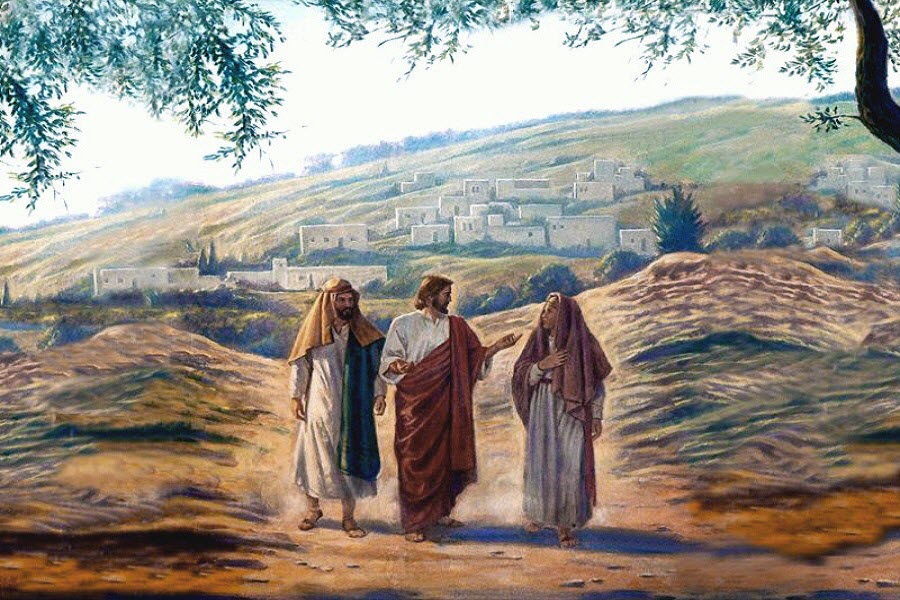
In Luke 24:13-33, we encounter one of the most profound and transformative moments recorded in the Bible — the walk of two disciples to the village of Emmaus. This journey not only serves as a poignant narrative of these disciples grappling with their utterly shattered hopes but also acts as a divine prefiguration of our own spiritual journey here on this Earth, as we walk towards our heavenly destination.
THE CONTEXT OF THE JOURNEY
The disciples’ walk to Emmaus occurs on a Sunday, the first day of the week, a day heavy with the immediate aftermath of a spiritually tumultuous and emotionally devastating week. Just days earlier, the crowds in Jerusalem had hailed the Lord Jesus with exuberant shouts of “Hosanna to the Son of David!” (Matthew 21:9). The very air was thick with messianic expectation.
Many fervently believed the Messiah had finally come to establish His earthly kingdom, bringing peace, deliverance from Roman oppression, and national prosperity. But the subsequent, shocking events—the Lord’s entry into the temple, His sharp confrontations with the entrenched religious leaders, the betrayal by one of His own and ultimately, His brutal crucifixion—left these disciples utterly bewildered, confused, and heartbroken. The same crowd that had so recently celebrated Him just days ago had then turned virulently against Him, leading to a profound emotional and spiritual crisis for all those who had sincerely placed their hopes and dreams on Him.
THE UNRECOGNIZED PRESENCE OF CHRIST
As these two disciples walked along the road, their hearts heavy with grief and disappointment, they were joined by a seeming stranger—it was the Lord Jesus Himself, now risen from the dead. However, the Scripture clearly states, “their eyes were holden that they should not know him” (Luke 24:16). Several factors likely contributed to this lack of recognition: the Lord Jesus’ new, glorified resurrection body and, most significantly, a divine intervention deliberately preventing their immediate recognition.
This particular aspect parallels the truth revealed in Romans 11:25, which discusses the temporary spiritual blindness that has come upon Israel concerning their Messiah. Just as these disciples were, for a time, unable to recognize their risen Lord, many today, even within religious circles, fail to see Him for who He truly is. This serves as a solemn reminder that only God can supernaturally open our spiritual eyes to behold and understand divine truths.
THE EXPRESSION OF CRUSHED HOPES
In their sorrowful conversation with this “stranger,” the disciples openly expressed their deeply shattered hopes:
“But we trusted that it had been he which should have redeemed Israel” (Luke 24:21).
This heartfelt sentiment reflects a universal human struggle when expectations are not met in the way we anticipate. Great examples of this today are those who preach a superficial “prosperity gospel” often promise earthly ease, constant health and material abundance, but the hard reality is that many who follow such teachings will eventually find their hopes dashed against the rocks of life’s difficulties.
True hope in the Lord Jesus Christ, founded on His Word, does not lead to ultimate disappointment, it is the misplaced hope, based on human misunderstanding or false promises that does. The disciples’ profound disappointment arose from their misunderstanding of the true nature and timing of Lord’s redemptive role and the necessity of His suffering and death before His glorification.
THE GREATEST BIBLE STUDY OF ALL TIME
In verses 25-27 of Luke 24, our Lord Jesus responds to their despair not with mere sympathy, but with divine instruction. He gently rebukes their slowness of heart to believe all that the prophets had spoken, urging them to see the absolute necessity and fulfillment of Old Testament prophecies concerning the Messiah:
“Then he said unto them, O fools, and slow of heart to believe all that the prophets have spoken: Ought not Christ to have suffered these things, and to enter into his glory? And beginning at Moses and all the prophets, he expounded unto them in all the scriptures the things concerning himself.”
This incredible moment is often described, and rightly so, as the greatest Bible study ever conducted. The Lord Jesus Himself explained how the entirety of Scripture—from Genesis, through the Law of Moses, the Psalms, and all the Prophets—points directly and unequivocally to Him, detailing His suffering, death, resurrection, and subsequent glory. This powerfully highlights the absolute necessity of a solid, comprehensive foundation in Holy Scripture to grasp deeper spiritual truths and to understand God’s unfolding plan.
THE GOD WHO WANTS TO BE WANTED
Luke 24:28 “And they drew nigh unto the village, whither they went: and he made as though he would have gone further.”
In verse 28, as they neared Emmaus, Jesus “made as though he would have gone further.” This act was not a deception, but rather a divine test of the disciples’ true desire for Him and His words. This reflects a profound divine principle: God does not impose Himself upon us; rather, He often waits for a genuine, heartfelt invitation from us. The disciples’ strong, earnest urging for Him to stay with them—“Abide with us: for it is toward evening, and the day is far spent” (Luke 24:29)—beautifully exemplifies our deep need to actively seek His presence and fellowship. Our spiritual hunger for God should compel us to desire more of Him, more of His Word, more of His company, mirroring the fervent longing of these two disciples.
THE BURNING HEART: EVIDENCE OF HIS PRESENCE
Luke 24:30-31 “And it came to pass, as he sat at meat with them, he took bread, and blessed it, and brake, and gave to them. And their eyes were opened, and they knew him; and he vanished out of their sight.”
When the Lord Jesus sat with them, He took the bread, blessed it, broke it and gave it to them. Then a miraculous thing happened:
“their eyes were opened, and they knew him; and he vanished out of their sight” (Luke 24:30-31).
The act of breaking bread here symbolizes not just a meal, but the sharing of spiritual nourishment, divine revelation and intimate fellowship. This moment of recognition led to a powerful, subsequent reaction as they reflected on their journey:
“And they said one to another, Did not our heart burn within us, while he talked with us by the way, and while he opened to us the scriptures?” (Luke 24:32).
This burning sensation in their hearts serves as a divine indicator, a spiritual confirmation of being on the right track and of encountering the living Truth. When we genuinely engage with the truth of God’s Word, as opened to us by His Spirit, our hearts should resonate with a similar spiritual joy, warmth and recognition, driving us ever closer to Him.
RETURNING TO THE SOURCE
Luke 24:32-33 “And they said one to another, did not our heart burn within us, while he talked with us by the way, and while he opened to us the scriptures? And they rose up the same hour, and returned to Jerusalem, and found the eleven gathered together, and them that were with them.”
In verses 32-33, the disciples, now utterly transformed by their personal encounter with the risen Christ, immediately returned to Jerusalem, the very place of their recent sorrow and fear. Their journey back emphasizes that true knowledge of Christ ignites a burning passion within us, compelling us to share the good news and to testify of His reality. The act of returning signifies a divinely restored hope, a renewed sense of purpose, and an urgent mission to bear witness about their life-changing experience with the resurrected Lord.
CONCLUSION: OUR SPIRITUAL JOURNEY
The walk to Emmaus teaches us essential and timeless truths about genuine faith, enduring hope, and the earnest quest for deeper spiritual understanding. As we navigate our own individual spiritual journeys in these last days, we must always remember that the Lord Jesus Christ desires to reveal Himself to us in a personal and profound way. Like the disciples on that dusty road, we must actively seek Him, recognize our desperate need for a strong, unshakeable foundation in Holy Scripture, and allow our hearts to burn with the truth He imparts through His Word and by His Spirit.
Let us not merely walk passively through this life; instead, let us, like those Emmaus disciples, strive to urge Him to stay with us, to cultivate a deep desire for an ever-deeper relationship with Him, and to respond to His divine revelations with burning hearts filled with overflowing joy, unwavering hope and a renewed sense of eternal purpose. Amen.
![]()




More Stories
THE PREHISTORIC EARTH
HE SAT WITH ME WHILE I WAS BROKEN
YOU WERE CHOSEN IN THE DARK